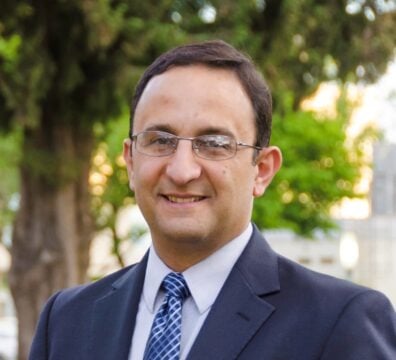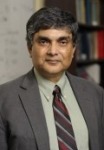Leading and collaborating
Faculty
Leadership Team

Lauren Gardner
Alton and Sandra Cleveland Professor In Civil and Systems Engineering
CSSE Director
Website
Lauren Gardner is the Alton and Sandra Cleveland Professor in the Department of Civil and Systems Engineering at Johns Hopkins Whiting School of Engineering and holds a joint appointment In the Bloomberg School of Public Health. She is a specialist in modeling infectious disease risk, including COVID-19, measles, dengue, Zika, Avian influenza, and other emerging infectious diseases. Her work focuses holistically on virus diffusion as a function of climate, land use, human behavior, mobility and other contributing risk factors. She is also the creator of the interactive web-based dashboard being used by public health authorities, researchers, and the general public around the globe to track the outbreak of the novel coronavirus that spread worldwide beginning in January 2020. [Google Scholar]
Research Interests
- Infectious Disease Modeling,
- Data-driven epidemic planning and decision making
- Network modeling, system design, and optimization

Kimia Ghobadi
John C. Malone Assistant Professor of Civil and systems Engineering
CSSE Associate Director
Website
Kimia Ghobadi is a John C. Malone Assistant Professor of Civil and Systems Engineering and Malone Center for Engineering in Healthcare at the Whiting School of Engineering. Prior to that, she was a postdoctoral fellow at MIT Sloan School of Management, and received her PhD in Industrial Engineering at the University of Toronto. She obtained her Bachelor in Mathematics at Sharif University and her Masters’ in Mathematics and Computational Engineering and Science at McMaster University. Kimia is a recipient of INFORMS Judith Liebman award and Canada’s Natural Sciences and Engineering Research Council’s graduate and postdoctoral scholarships. [Google Scholar]
Research Interests
- Inverse optimization
- Mathematical Modeling
- Analytics
- Healthcare Operations
- Medical Decision-making
- Public Health
Faculty Members

Takeru Igusa
Professor of Civil and systems Engineering
Website
Tak Igusa is a Professor in the Department of Civil and Systems Engineering where he has been a faculty member since 1999. While his initial research was focused on systems analysis of civil and mechanical structures, during the past 10 years he has pursued collaborations throughout Johns Hopkins to explore wider applications of systems methods. [Google Scholar]
Research Interests
- System Dynamic Modeling
- Agent Based Modeling
- Modeling Frameworks for Predicting the Onset of Chronic Disorders
- Systems Modeling of the Causes of Obesity and Non-communicable Diseases
- Community Resilience
- Structural Dynamics
- Acoustics

Uzi (Yury) Dvorkin
Associate Professor of Civil and Systems Engineering
Website
Uzi (Yury) Dvorkin is an associate research professor in the departments of Civil and System Engineering and Electrical Computer and Engineering and a member of the Ralph S. O’Connor Sustainable Energy Institute.
Using multi-disciplinary methods in engineering, operations research, economics, and policy analysis, Dvorkin develops models and algorithms to assist society in accommodating challenges posed by emerging smart grid technologies, such as intermittent power generation, demand response, storage, smart appliances, and cyber-infrastructure. His research is funded by the National Science Foundation, U.S. Department of Energy, U.S. Department of Transportation, Advanced Research Projects Agency-Energy, Electric Power Research Institute, New York State Energy Research and Development Authority, and the Alfred P. Sloan Foundation.
Previously, Dvorkin was an assistant professor and Goddard Junior Faculty Fellow in the Department of Electrical and Computer Engineering at New York University’s Tandon School of Engineering, with an affiliated appointment at NYU’s Center for Urban Science and Progress. [more…]
Susu Xu, an assistant professor in the Department of Civil and Systems Engineering, focuses on research rooted in mobile sensing, machine learning, urban computing, smart infrastructure systems, and rapid disaster response. Her current projects include developing learning algorithms and incentive mechanisms to improve efficiency of urban crowdsensing networks and collaboration, physics-informed machine learning algorithms to enable smart and fairness-aware urban infrastructure systems, and multi-sourced, multi-modal sensing and learning to enable and enhance rapid disaster response systems.
Applications of Xu’s research target near-real-time disaster information systems for natural hazards (earthquakes, hurricanes, wildfires), spatio-temporal urban sensing and data mining (air pollution, traffic, noise), and large-scale infrastructure monitoring (buildings, bridges, and railway tracks).
Xu is a recipient of multiple awards and honors, including the American Society of Mechanical Engineers (ASME) Structural Health Monitoring (SHM) Best Journal Paper Award in 2022 and 2023, the International Conference on Machine Learning and Applications (ICMLA) Best Paper Award in 2018, the Champion of NeurIPS Adversarial Vision Challenge, and MIT’s Civil and Environmental Engineering Rising Star award. Her research has been sponsored by multiple agencies, including the National Science Foundation (NSF), the United States Geological Survey (USGS), the National Institute of Standards and Technology (NIST), and the Department of Transportation (DOT). Xu has also served as a technical committee member and an organizing committee member in multiple top-tier conferences, including the Association for Computing Machinery (ACM) SenSys, ACM’s BuildSys, Ubicomp, and the American Society of Civil Engineers (ASCE) Engineering Mechanics Institute (EMI) Structural Health Monitoring and Control (SHMC) Conference.
Prior to joining Hopkins faculty in 2024, Xu completed postdoctoral research at Stanford University, served as an assistant professor at Stony Brook University, and a machine learning researcher at Qualcomm AI Research. She holds a PhD in advanced infrastructure systems and an MS in machine learning from Carnegie Mellon University and a BS from Tsinghua University.

Hao (Frank) Yang
Assistant Professor of Civil and systems Engineering
Website
Hao (Frank) Yang is an assistant professor in the Department of Civil and Systems Engineering. His innovative research centers around developing Trustworthy Machine Learning and data science methods to improve the Equity, Safety, and Sustainability of Urban Systems, especially in human mobility, transportation and public health. This includes developing new sensors and data-driven perception solutions, creating ethical and trustworthy machine-learning methods, and building human-machine cooperative traffic systems.
Yang is an active member of several standing committees within the Transportation Research Board and the American Society of Civil Engineers Transportation & Development Institute’s AI Committee. His achievements include receiving the Michael Kyte Outstanding Student of the Year Award from the U.S. Department of Transportation in 2022, the 2022 High-Value Research Award from the American Association of State Highway and Transportation Officials, the Best Paper Award from the Transportation Research Board Information Systems and Technology Committee in 2023, and both the Best and Outstanding Dissertation Award from the Chinese Overseas Transportation Association and the Transportation Research Board in 2024.
Prior to Yang’s appointment at Johns Hopkins University, he worked as a research scientist at the National Science Foundation AI Institute for Edge Computing Leveraging Next Generation Networks and the Department of Electrical and Computer Engineering at Duke University. He obtained bachelor’s degrees in electrical and computer (telecommunication) engineering from both the Beijing University of Posts and Telecommunications and the University of London. He completed his PhD in civil engineering (transportation) at the University of Washington.

Gonzalo L. Pita
Associate Scientist and Director of the MSE in Systems Engineering
Website
Gonzalo Pita is an associate research scientist and Director of the MSE in Systems Engineering program in the Department of Civil and Systems Engineering, where he has been since 2008 in different capacities. He leads multidisciplinary research on the quantification of natural disaster risk and vulnerability modeling, among other topics. Since 2013, Gonzalo has also served as a senior specialist at the World Bank, where he leads projects in natural hazards risk assessment, design and implementation of asset management systems, and design of natural disaster mitigation public policy.
Research Interests
- Natural catastrophe risk simulation
- Structural vulnerability modeling
- System dynamics
- Impacts of climate change
- Risk-based asset management systems
- Modeling of natural hazards (hurricanes, earthquakes, floods).
- Development of building inventory with remote sensing.
- Quantification of hazards’ impact on national budgeting processes
- Analysis and design of disaster risk financing policies

Jan Drgona
Incoming Associate Professor
Website
Ján Drgoňa is an incoming associate research professor in the department of Civil and Systems Engineering and a member of the Ralph S. O’Connor Sustainable Energy Institute.
His innovative research centers on differentiable programming and scientific machine learning (SciML) for dynamical systems, optimization, and control. He has particular experience in the deployment of machine learning and advanced control methods for real-world applications, including building energy systems and industrial process control.
Previously, Drgoňa was a principal investigator and research data scientist at Pacific Northwest National Laboratory (PNNL) where he served as the lead software developer of Neuromancer SciML library for learning to solve constrained optimization, physics-informed machine learning, and optimal control problems. Within two years, the library became the most popular open-source repository released by PNNL.
Drgoňa is a member of the Institute of Electrical and Electronics Engineers and the Association for Computing Machinery. He regularly serves as a reviewer for related journals including Applied Energy, Automatica, IEEE Control Systems Letters, IEEE Transactions on Control Systems Technology, IEEE Transactions on Industrial Informatics, Control Engineering Practice, Journal of Process Control, Energy and Buildings, Journal of Control Automation and Electrical Systems, and Electric Power Systems Research.
Drgoňa earned his BSc, MSc, and PhD in control engineering from the Institute of Information Engineering, Automation, and Mathematics at the Slovak University of Technology. Prior to his work with PNNL, he held a postdoctoral position in the Mechanical Engineering Department at KU Leuven in Belgium.
Research Interests
- Differentiable programming
- Scientific machine learning for dynamical systems, optimization, and control
- Building energy systems
- Process control

Magdalena Klemun
Assistant Research Professor
Website
Magdalena Klemun is an assistant research professor in the Department of Civil and Systems Engineering and a member of the Ralph S. O’Connor Sustainable Energy Institute. Her research explores how energy technologies and systems change as a function of investments in technological innovation, with a particular interest in understanding relationships between technology design and performance evolution. Klemun’s research aims to enable more targeted climate innovation efforts, improve the availability of explanatory information about technology trends to enhance road mapping, engineering design, and policy development, and advance theories of technological change.
Current research areas in her lab—the Deployment Lab —focus on advancing data-driven frameworks to study the evolution of energy policies and technologies, including both hardware and “soft technologies” (the knowledge and codified practices used during processes of technology design, installation, permitting, community engagement, use, and end-of-life management); informing policies and technology design to accelerate industry decarbonization and manage the environmental impacts of advanced digitalization; and developing technology-level metrics to support sustainable development. Klemun’s research has been featured in journals such as Nature Energy, Nature Communications, Joule, iScience, and Environmental Research Letters.
Prior to joining Johns Hopkins, Klemun was an assistant professor in the Academy of Interdisciplinary Studies (AIS) at the Hong Kong University of Science and Technology, and a postdoctoral associate at the Massachusetts Institute of Technology’s Institute for Data, Systems, and Society (IDSS). Before earning her PhD, she was a power grid analyst with energy consultancy GTM Research in New York.
Klemun earned her BS in electrical engineering and information technology from Vienna University of Technology, her MS in earth resources engineering from Columbia University, where she studied as a Fulbright Scholar, and a PhD from the Institute for Data, Systems, and Society at Massachusetts Institute of Technology.
Research Interests
- Energy and infrastructure systems
- Technology evolution
- Climate and energy policy
- Technology assessment
- Innovation
- Sustainable development
Affiliate Faculty

Somnath Ghosh
Michael G. Callas Chair Professor of Civil and systems Engineering

Lori Graham-Brady
Department Chair Professor of Civil AND SYSTEMS Engineering

James K. Guest
Associate Professor of Civil AND SYSTEMS Engineering

Benjamin Schafer
Professor of Civil AND SYSTEMS Engineering

Michael D. Shields
Assistant Professor of Civil AND SYSTEMS Engineering

Sauleh Siddiqui
Associate Professor
Environmental Science
American University
